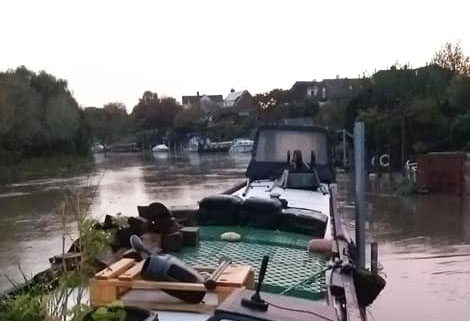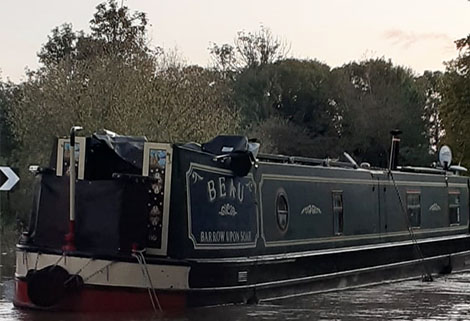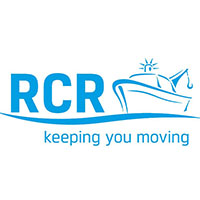coping with rising and falling water levels
boat safety in extreme weather
As the UK continues to experience severe and unprecedented downfalls, River Canal Rescue (RCR) is reminding boaters how to cope with suddenly rising and falling water levels.
At the end of October, RCR was called to assist six stranded or precariously positioned boats at risk of capsize across the country; one of which was passed onto the emergency services to recover, due to the boat being inaccessible and the owner at risk if he remained on board.
 RCR managing director, Stephanie Horton, advises: “The key to dealing with our increasingly extreme weather conditions is timing and balancing health and safety. In order to stop a vessel drifting onto land when water levels rise, position a scaffold pole or poles, or a boarding plank, between the boat and the river/canalside edge and fix it into position. This acts as a mooring post, preventing flood waters from floating the boat onto land.
RCR managing director, Stephanie Horton, advises: “The key to dealing with our increasingly extreme weather conditions is timing and balancing health and safety. In order to stop a vessel drifting onto land when water levels rise, position a scaffold pole or poles, or a boarding plank, between the boat and the river/canalside edge and fix it into position. This acts as a mooring post, preventing flood waters from floating the boat onto land.
“Alternatively use the engine to keep the vessel in position, so when the water rises, the power of the boat keeps it in deeper water. However be mindful that as the propeller is at its lowest point, it can easily be damaged if the boat does drift. These options are not advisable other than in emergencies and if you have the opportunity, moor in a lock as it provides some protection from flood waters.
 “If the boat has drifted, it’s all about timing; when the water levels start to go down, try to push the boat back into the water or off the land before they drop too far. But be cautious as this can be dangerous, particularly if you’re unable to see under the water.
“If the boat has drifted, it’s all about timing; when the water levels start to go down, try to push the boat back into the water or off the land before they drop too far. But be cautious as this can be dangerous, particularly if you’re unable to see under the water.
“We usually dispatch two engineers in dry suits to undertake this manoeuvre because although it sounds and looks easy, knowing the best way to re-launch a boat and where to push depends on the severity of the grounding, depth of the water, its flow and accessibility.
“In cases like this timing is everything and too much or too little water can make the difference to the outcome.”
Over the weekend, RCR engineers were able to get to the locations quickly and save a number of vessels before they were left high and dry. Although on site for less than a couple of hours, it averted the need to spend time and money on cranes, transport, and manpower to move them once stranded.
If a vessel is caught in a situation, RCR urges boaters not to attempt a recovery without assistance. Stephanie concludes: “Severe weather conditions increase the risk to boat owners and simple tasks can easily result in accidents and injury.”
RCR also reminds boat owners to check their insurance policies. As insurance companies try to minimise their exposure, the firm’s finding more third-party only policies exclude salvage and wreck removal - one of the biggest risks to boats.

